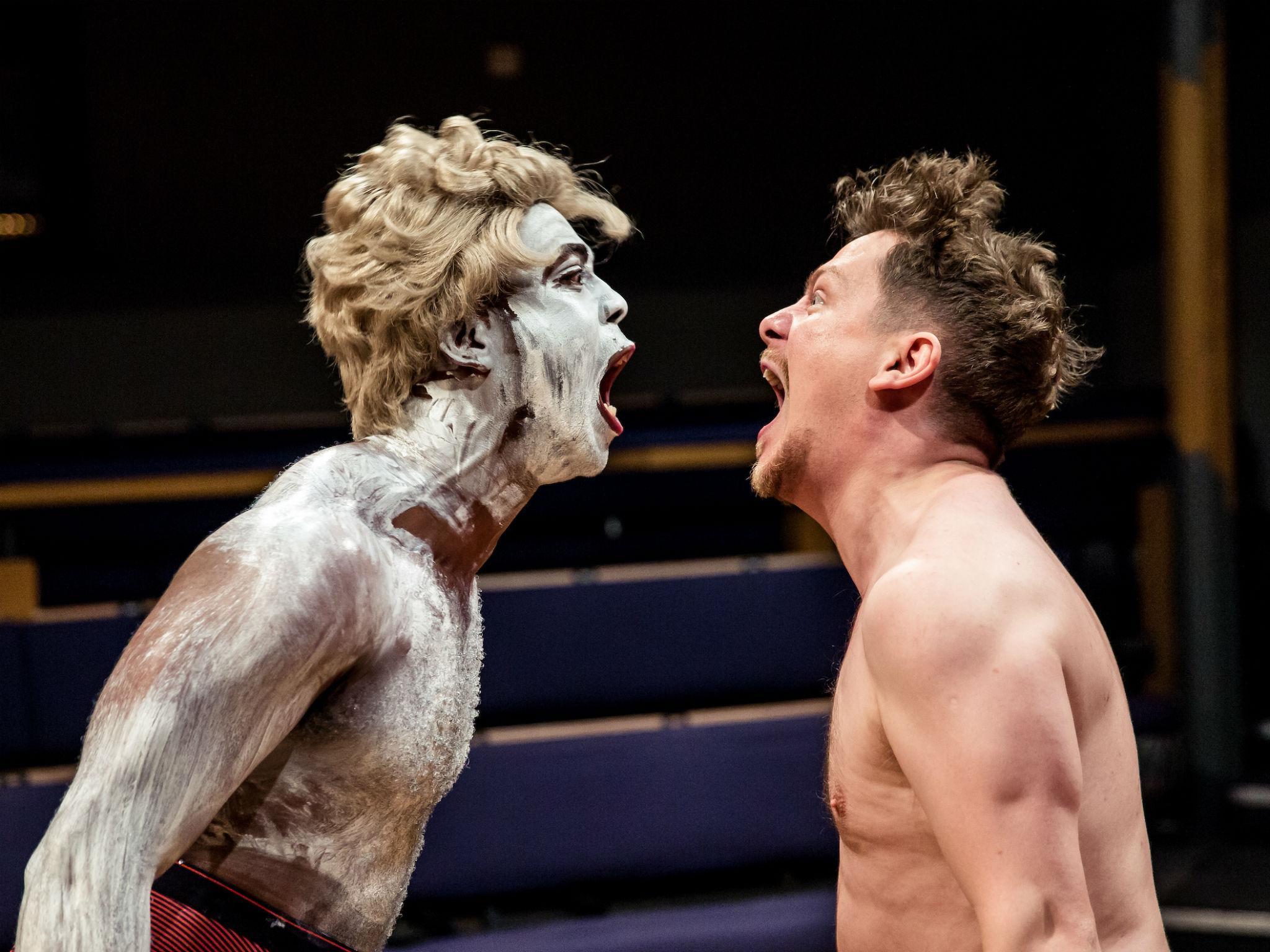An Octoroon, Orange Tree, Richmond, review: This is an energising production, unafraid of the necessary madcap messiness
Black actors wear whiteface and white actors assume blackface in Branden Jacobs-Jenkins's play which deals with the issues of racial difference with playful provocativeness

Your support helps us to tell the story
From reproductive rights to climate change to Big Tech, The Independent is on the ground when the story is developing. Whether it's investigating the financials of Elon Musk's pro-Trump PAC or producing our latest documentary, 'The A Word', which shines a light on the American women fighting for reproductive rights, we know how important it is to parse out the facts from the messaging.
At such a critical moment in US history, we need reporters on the ground. Your donation allows us to keep sending journalists to speak to both sides of the story.
The Independent is trusted by Americans across the entire political spectrum. And unlike many other quality news outlets, we choose not to lock Americans out of our reporting and analysis with paywalls. We believe quality journalism should be available to everyone, paid for by those who can afford it.
Your support makes all the difference.Director Ned Bennett and his cast are wonderfully on the wavelength of the hectic ingenuity and high-energy ambivalence of the approach to the material in their European premiere of Branden Jacobs-Jenkins's Obie Award-winning play.
With a pointed switch to the indefinite article in its title, the piece is a wily riff on The Octoroon, Dion Boucicault's once-celebrated 1859 melodrama, set on a debt-ridden Louisiana cotton plantation that's on the point of being sold, about the forbidden love between young gentleman, George, the heir apparent, and Zoe, the one-eighth black girl (the eponymous “octoroon”) who is the well-educated, illegitimate daughter of the deceased owner.
Issues of racial difference and how it's represented on stage are heightened with a playful provocativeness by the meta-theatrical framework and by the deconstructionist interventions that expose the workings of this former blockbuster, which sparked progressive debate in its day about the abolition of slavery and mixed-race relationships but now comes across as a minefield of political incorrectness because of its genuflections to the sometimes conflicting demands of a crowd-pleasing, sensational genre.
Stereotypes are subverted from the first scene in which BJJ, Jacobs-Jenkins's alter ego, clad in only underpants and socks, shares with us his frustrations at being a “'black playwright'”. Ken Nwosu is splendidly arch, knowing and exasperated: “I can't even wipe my ass without someone trying to accuse me of deconstructing the race problem in America”.
Black actors wear whiteface (juggling blonde wig and moustache-mask and getting into fierce fights with himself, Nwosu performs a brilliantly berserk treble as gentle George and the dastardly villain, M'Closky). White actors wear blackface. Boucicault himself, amusingly resurrected by Kevin Trainor as a squiffy Irishman, marvels that you can now use performers of colour (“You really save on make-up”), but obstinately smears on the red slap so that he can reprise his hit role as Wahnotee, the Native American wrongly accused of murdering a slave boy.
As the house lights snap back on for discussions about how plot twists that were once novel (a crime accidentally captured on a photographic plate, for example) have now dated or about the extent to which the values of the piece were shaped by the expectations of melodrama, the cast negotiate the shifts of tone and register with an unerring niftiness. This is not an exercise in arid debunking; you can tell that the 32-year-old author would not have been detained by The Octoroon if there were not something, amidst all the wince-making lapses, that he respected about it. He has an attractive sense of the absurd (did I mention that a massive-headed Brer Rabbit makes random, tap-dancing forays into the proceedings?) and, though the cleverness of the venture comes close to outsmarting itself at points, there's depth and wisdom in the way the play examines the long legacy of slavery and its effects on how we still speak about race.
In convening a dialogue between past and present, Jacobs-Jenkins's most engaging and expressive creations are the two sassy house-slaves, Minnie and Dido (beautifully played Vivian Oparah and Emmanuella Cole), who banter about life as a 19th century chattel and the uncertain future in an idiom closer to Queen Latifah: “What you gonna do once you free? You just gonna walk up somebody house and be like, 'Hey, I'm a slave help me?’”
This is an energising production, unafraid of the necessary madcap messiness, and it whets the appetite for Gloria, another piece by the same writer which has its English premiere at Hampstead Theatre next month.
Join our commenting forum
Join thought-provoking conversations, follow other Independent readers and see their replies
Comments